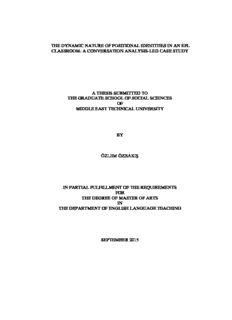Table Of ContentTHE DYNAMIC NATURE OF POSITIONAL IDENTITIES IN AN EFL
CLASSROOM: A CONVERSATION ANALYSIS-LED CASE STUDY
A THESIS SUBMITTED TO
THE GRADUATE SCHOOL OF SOCIAL SCIENCES
OF
MIDDLE EAST TECHNICAL UNIVERSITY
BY
ÖZLEM ÖZBAKIġ
IN PARTIAL FULFILLMENT OF THE REQUIREMENTS
FOR
THE DEGREE OF MASTER OF ARTS
IN
THE DEPARTMENT OF ENGLISH LANGUAGE TEACHING
SEPTEMBER 2015
Approval of the Graduate School of Social Sciences
Prof. Dr. Meliha AltunıĢık
Director
I certify that this thesis satisfies all the requirements as a thesis for the degree of
Master of Arts.
Assoc. Prof. Dr. Nurten Birlik
Head of Department
This is to certify that we have read this thesis and that in our opinion it is fully
adequate, in scope and quality, as a thesis for the degree of Master of Arts.
Assist. Prof. Dr. Hale IĢık Güler
Supervisor
Examining Committee Members
Prof. Dr. Gölge Seferoğlu (METU, FEDU)
Assist. Prof. Dr. Hale IĢık Güler (METU, FLE)
Assist. Prof. Dr. Olcay Sert (HUN, FEDU)
I hereby declare that all information in this document has been obtained and
presented in accordance with academic rules and ethical conduct. I also declare
that, as required by these rules and conduct, I have fully cited and referenced
all material and results that are not original to this work.
Name, Last name : Özlem ÖZBAKIġ
Signature :
iii
ABSTRACT
THE DYNAMIC NATURE OF POSITIONAL IDENTITES IN AN EFL
CLASSROOM A CONVERSATION ANALYSIS-LED CASE STUDY
ÖzbakıĢ, Özlem
M.A., Department of English Language Teaching
Supervisor: Assist. Prof. Dr. Hale IĢık Güler
September 2015, 206 pages
Throughout the past decades, socially oriented studies have become the leading
topics in the fields of SLA and Applied Linguistics. Within this framework, in
particular, identity has attracted its deserved attention following Norton’s work
(1995, 2000, 2013) as Block (2007) puts forward. In line with this case, an extensive
body of research has provided significant insights into the links between identity
and language learning. However, analyzing classroom interactions in an EFL
context has been the core subject of very few scholars in identity literature. In that
sense, this study aims to understand how positional identities were constructed and
negotiated in interaction in an EFL setting, and further to explore how these
positional identities interact with learners’ getting access to language learning
opportunities. Guided by positioning theory (Davies and Harre, 1990), this study has
been conducted in an EFL classroom of a preparatory English program of a private
university in Central Anatolia in Turkey and a conversation analytic approach is
utilized to analyze 55 hours of audio-video recordings of classroom interactions.
iv
Displaying different identity negotiation from other members of the class during the
term, three students were chosen as focal participants. The findings reveal that by
adopting and being assigned a variety of positions in the sequential organization of
interaction, students constitute and negotiate certain identities such as being
competent, talkative or humorous and these identities are quite dynamic and play a
vital role in students’ language learning opportunities. By bridging the gap with a
different methodology and context, this study contributes to the existing knowledge
of identity research.
Key words: Identity, Positioning, Conversation Analysis
v
ÖZ
YABANCI BĠR DĠL OLARAK ĠNGLĠZCE’NĠN ÖĞRETĠLDĠĞĠ SINIFLARDA
KONUMLANDIRILMIġ KĠMLĠKLERĠN DĠNAMIK DOĞASI
KONUġMA ÇÖZÜMLEMESI ODAKLI ÖRNEK OLAY ĠNCELEMESĠ
ÖzbakıĢ, Özlem
Yüksek Lisans, Ġngiliz Dili Öğretimi
Tez Yöneticisi: Yrd. Doç. Dr. Hale IĢık Güler
Eylül 2015, 206 sayfa
Onlarca yıldır, sosyal konuları içeren çalıĢmalar ikinci yabancı dil edinimi ve
uygulamalı dilbilim alanında da önde gelen konu olmuĢtur. Bunun sonucu olarak,
özellikle kimlik, Block ‘un (2007) da belirttiği gibi Norton’un çalıĢmasının ardından
hak ettiği ilgiyi görmüĢtür. Bu durumla uyumlu olarak, kapsamlı birçok çalıĢma
yabancı dil öğrenme ve kimlik arasındaki iliĢkiye önemli ölçüde ıĢık tutmuĢtur.
Ancak yabancı dil olarak Ġngilizce’nin öğretildiği sınıflarda sınıf içi etkileĢiminin
incelenmesi oldukça az bilim insanın değindiği bir konu olmuĢtur. Bu bağlamda, bu
çalıĢma yabancı dil olarak Ġngilizce öğretilen bir sınıfta, öğrencilerin nasıl
konumlandırılmıĢ kimlik oluĢturduklarını, buna paralel olarak nasıl müzakereye
vardıklarını analiz etmektedir ve bu konumlandırılmıĢ farklı kimliklerin sınıf içinde
yabancı dil öğrenme olanaklarıyla nasıl iliĢkili olduğunu anlamayı amaçlamaktadır.
Bu çalıĢma, konumlandırma teorisi (Davies and Harre, 1990) tarafından
yönlendirilerek, Türkiye’de Ġç Anadolu’da özel bir üniversitenin hazırlık
programındaki yabancı dil olarak Ġngilizce öğretilen bir sınıfta uygulanmıĢtır ve 55
vi
saatlik sınıf içi ses ve görüntü kayıtlarını incelemek için konuĢma çözümlemesi
yöntemi kullanılmıĢtır. Sınıfın diğer üyelerinden farklı kimlik müzakereleri gösteren
üç öğrenci odak katılımcı olarak seçilmiĢtir. Sonuçlar gösteriyor ki, öğrenciler
etkileĢimin dizisel yapısında çeĢitli Ģekillerde hem konumlar benimseyip hem de
baĢkaları tarafından konumlandırılarak yetkin, konuĢkan ya da esprili olmak gibi
belli baĢlı kimlikler oluĢturmaktadır ve müzakereye varmaktadır. Bu kimlikler
oldukça dinamik olmakla birlikte öğrencilerin öğrenme olanaklarında önemli rol
oynar. Bu çalıĢma, literatürdeki boĢluğu farklı bir yöntem ve araĢtırma ortamıyla
destekleyerek, kimlik araĢtırmalarına katkı sağlayacaktır.
Anahtar Kelimeler: konumlandırma, konuĢma çözümlemesi, kimlik
vii
To My Beloved Parents,
Seher and Hasan ÖZBAKIġ
whom I miss at every moment of my life
wherever you are…
viii
Description:The cultural productions of the ESL student at Tradewinds High: . Kimlik kavramı sözlük anlamı dışında birçok alanda, disiplinler arası çalışmalarda.

